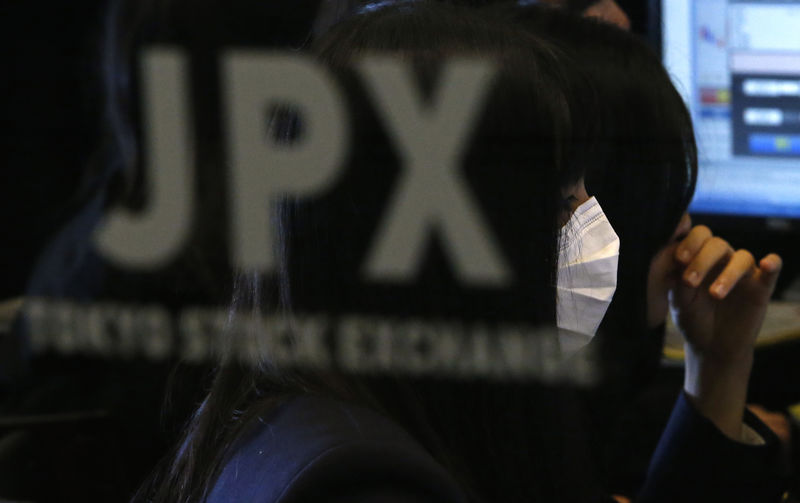By Stanley White
TOKYO (Reuters) - Asian stocks edged up on Monday as Chinese shares reversed early losses, supported by hopes for progress in resolving the U.S.-China trade war, while sterling slipped after the British parliament delayed a crucial vote on a Brexit withdrawal deal.
MSCI's broadest index of Asia-Pacific shares outside Japan (MIAPJ0000PUS) rose 0.25%. Chinese shares (CSI300) advanced 0.31%, while Japan's Nikkei (N225) rose 0.30%.
The pan-region Euro Stoxx 50 futures (STXEc1) were up 0.22%, German DAX futures (FDXc1) 0.19% and FTSE futures (FFIc1) just 0.04%.
The pound slipped from a five-month high against the dollar and the euro after the British parliament forced Prime Minister Boris Johnson to seek a delay to an Oct. 31 deadline for Britain's departure from the bloc.
The vote for an extension dealt a blow to optimism that a deal agreed last week would ensure Brexit happens with little economic disruption.
Oil futures fell as lingering economic growth concerns and excess supplies of crude prompted speculators to trim their long positions.
The Chinese stock market appeared to take some encouragement from comments by Chinese vice premier Liu He on Friday that Beijing will work with the United States to address each other's concerns, and that stopping the trade war would be good for both sides and the world.
Also on Friday, U.S. President Donald Trump said he thinks a trade deal between the United States and China will be signed by the time Asia-Pacific Economic Cooperation meetings take place in Chile on Nov. 16-17.
Shares in Hong Kong also got a lift after Chinese bourses revised rules to allow mainland investors to buy Hong Kong-listed dual-class shares for the first time.
"We've had some positive news from Liu, and allowing Chinese investors direct access to dual-listed Hong Kong shares is a another positive," said Sean Darby, global equity strategist at Jefferies in Hong Kong.
"There is still a lot of money on the sidelines, and there are only eight or nine weeks left to put that money to work before we end the year. I expect markets to remain bid."
U.S. stock futures (ESc1) rose 0.22% in Asia as investors brace for high-profile earnings this week from Microsoft Corp (O:MSFT), Amazon.com (O:AMZN) and others.
The S&P 500 fell 0.4% on Friday partly due to worries about fallout from the U.S.-China trade war.
The 15-month long dispute over China's trade and industrial policies has shown few signs ending despite several rounds of talks.
Financial markets have been whipsawed over this period as a steady increase in tit-for-tat tariffs have slowed global trade and raised the risk of recession for some countries.
Underscoring the damage, Japan's exports fell in September for the 10th straight month, while South Korea's exports for the first 20 days of October dived 19.5% year-on-year, data on Monday showed.
Hong Kong shares (HSI) erased early losses to rise 0.26%.
Chinese bourses on Friday revised rules that would allow Hong Kong-listed dual-class shares to be included in the Stock Connect scheme for the first time, which boosted shares of popular tech companies Xiaomi Corp (HK:1810) and Meituan Dianping (HK:3690) on Monday.
The rule change, which will take effect on Oct. 28, could be a positive for Hong Kong shares, which have been battered during months of often violent protest against Chinese rule of the former British colony.
Graphic: FTSE vs U.S. and European bourses, https://fingfx.thomsonreuters.com/gfx/mkt/12/6939/6870/FTSE.png
The pound fell 0.6% to $1.2907 and was off about 0.4% to 86.47 pence per euro.
The British government insists Brexit will take place on Oct. 31, but uncertainty over how British lawmakers will respond could weigh on sentiment for sterling.
The leader of the House of Commons says the government plans to put the new Brexit deal to a debate and vote on Monday, but it is unclear if the speaker of the House will let this happen.
Elsewhere in the currency markets, the dollar edged 0.1% higher to $1.1158 per euro (EUR=EBS) rose slightly to 108.53 yen .
U.S. crude (CLc1) fell 0.22% to $53.66 a barrel. Brent crude (LCOc1) fell 0.27% to $59.26 per barrel.
Money managers cut their net long U.S. crude futures and options positions in the week to Oct. 15, the U.S. Commodity Futures Trading Commission (CFTC) said on Friday.
Long bets on U.S. crude have dropped sharply in the last two weeks after a spate of weak economic figures worldwide fanned concerns about global energy demand.
Treasury prices fell in Asia. The yield on benchmark 10-year Treasury notes (US10YT=RR) rose to 1.7607%.

Gold , often considered safe-haven asset, was little changed at $1,490.60 per ounce.